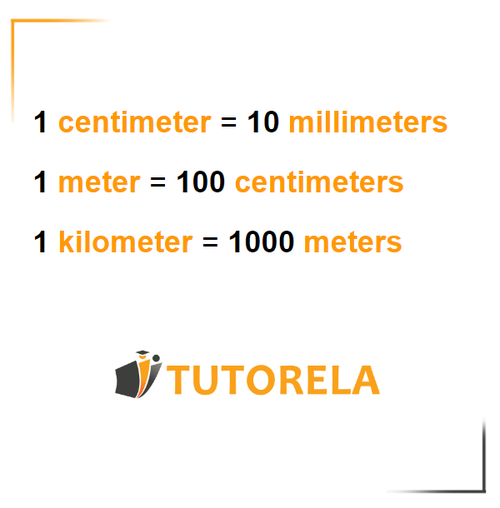Units of length allow us to quantify length, height and distance.
Units of length to know.
A centimeter is equivalent to millimeters.
A meter is equivalent to centimeters.
One kilometer is equal to meters.

Units of length allow us to quantify length, height and distance.
Units of length to know.
A centimeter is equivalent to millimeters.
A meter is equivalent to centimeters.
One kilometer is equal to meters.

Convert to meters:
\( 40 \) cm
How many centimeters are there in 1.56 meters?
Here the calculation is quite simple.
If one meter is equivalent to centimeters we should multiply it by to get the number of centimeters.
That is, meters equals centimeters.
Sometimes we will have to solve exercises in which we will have to convert a unit to a much smaller one. In this case we will make an intermediate calculation and go through a unit that is "in the middle".
For example, how many centimeters are there in 2 kilometers?
We know that one kilometer is equivalent to meters.
Therefore, we will first convert kilometers to meters and then meters to centimeters.
meters
meters?
We will multiply the km by :
Therefore, km equals meters.
Now we will make the conversion to centimeters.
.
centimeters?
We will multiply the m by and we get:
Therefore, km equals cm.
Another way is to multiply directly: knowing that to convert kilometers to meters you multiply by and to convert meters to centimeters you multiply by , we can multiply , that is, multiply directly by .
We recommend doing it step by step to avoid confusion :)
Which of the following values equals:
\( 5000 \)\( \) cm
Convert to cm:
\( 0.6 \) meters
Calculate the surface area of the box shown in the diagram.
Pay attention to the units of measure!
What is the concept of length?
Length can be defined as the part that measures an object from one side to another, that is, the distance between one point to another, the unit in the International System (SI) is meters, that is, we can measure the length of an object usually in meters, but there are also units of equivalence to this unit, such as centimeters, millimeters, hectometers, decameters and kilometers.
What are the instruments for measuring length?
There are different instruments to measure the length of an object or in other words the dimension or distance from one point to another, some of the most common instruments are the following:
What is a unit of length?
A unit of measure will be the one that we will use as a reference to measure and quantify an object, in the case of the unit of length is the meter by the International System of Units. The meter is the unit of reference most frequently used to measure the length of an object.
How many centimeters are meters?
For this exercise we must know that centimeters and meters are units of measurement that are multiples, i.e. in this case
So if a meter has centimeters, then let's make a multiplication
Then equals
How many centimeters are equal to inches?
In this case we must keep in mind that , so for this exercise let's do a multiplication
Therefore inches equals centimeters.
If you are interested in this article, you may also be interested in the following articles:
On Tutorela's website you can find a variety of mathematics articles.
Which of the following values equals:
cm
To solve the problem, let's follow these steps:
Now, let's work through each step:
Step 1: We know that . Therefore, to convert cm to meters, we divide by :
meters.
Step 2: Among the given choices, we are looking for meters, which matches .
Therefore, the solution to the problem is m.
m
Convert to cm:
meters
To solve the problem of converting meters to centimeters, we apply the following steps:
Let's carry out the calculation:
0.6 meters 100 = 60 centimeters.
Therefore, the conversion of 0.6 meters to centimeters is centimeters.
Convert to meters:
cm
To solve this problem, let's convert the measurement from centimeters to meters by following these steps:
This calculation shows that cm is equivalent to meters.
Therefore, the solution to the problem is .
Order from smallest to largest:
mm, cm, m, dm
Let's begin by converting each measurement to millimeters:
Now, comparing these converted lengths in millimeters:
Therefore, in ascending order, the lengths are:
cm
m
dm
mm
cm
m
dm
mm
Order from smallest to largest:
mm, dm, cm, m
To compare the measurements, convert all units to meters:
mm = m.
dm = m.
cm = m.
The smallest is m itself.
Order from smallest to largest:
m
m
m
m
m
dm
mm
cm
Order from smallest to largest:
\( 0.03 \) m, \( 5 \) cm, \( 25 \) mm, \( 0.001 \) dm
Order from smallest to largest:
\( 50 \) mm, \( 0.2 \) dm, \( 4 \) cm, \( 0.005 \) m
Order from smallest to largest:
\( 45 \) mm, \( 0.3 \) dm, \( 5 \) cm, \( 0.007 \) m